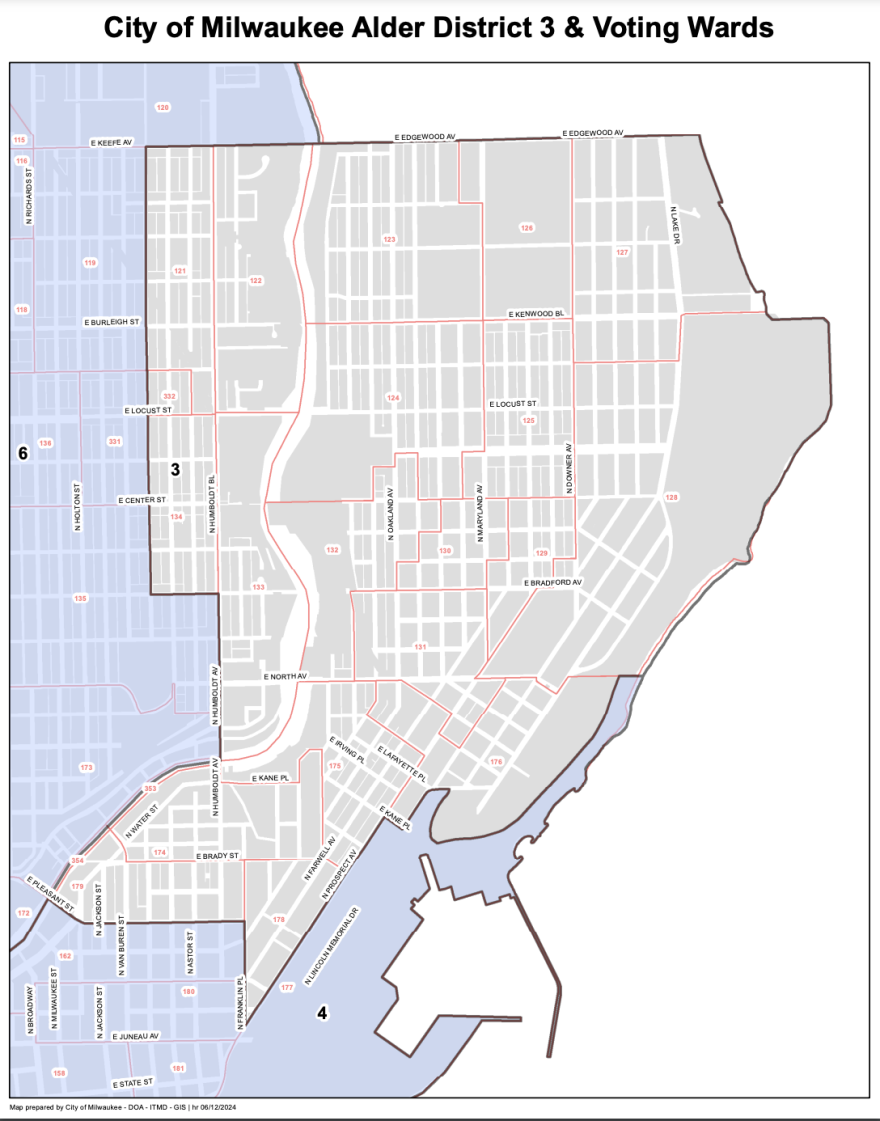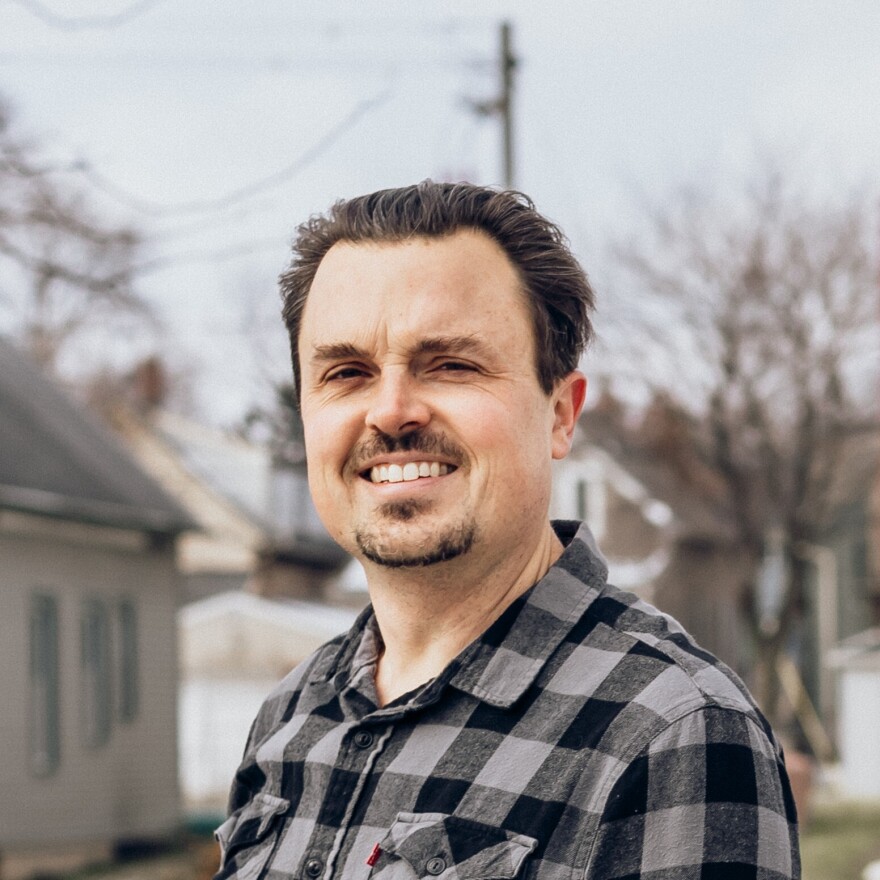Update: Alex Brower won the special election for Milwaukee Common Council District 3, according to preliminary results.
Alex Brower and Daniel Bauman are running for the District 3 seat on the Milwaukee Common Council. The race is a special election to fill the seat formerly held by Alderman Jonathan Brostoff, who died in November.
The winner of the April 1 election will fill the seat until April 17, 2028 — the end of Brostoff’s term. Brower and Bauman advanced to the general election after receiving the most votes out of eight candidates who ran in the Feb. 18 primary.
What does an alderperson on the Milwaukee Common Council do?
There are 15 aldermanic districts in the city of Milwaukee. One alderperson from each district is elected to a four-year term by the residents. They make up the lawmaking body of the city of Milwaukee, known as the Common Council.
The council exercises all policymaking and legislative powers of the city, including the adoption of ordinances and resolutions, the approval of the city's annual budget, and the enactment of appropriation and tax levy ordinances. The council also has approval over the mayor's appointments of cabinet heads, who direct day-to-day operations of city departments. In addition to their powers as legislators, council members serve as district administrators and are responsible to the citizens in their districts for city services.
The president of the Common Council is elected by council members at the beginning of the council’s term and serves for four years. The president makes all appointments to the council’s seven standing committees as well as many special committees and presides over all meetings of the full council. He or she becomes acting mayor when the mayor is out of the city.
Where is District 3?
District 3 covers much of the east side of Milwaukee. See the map below. If you're not sure about whether you live in District 3, you can look up your ballot for the April 1 election here.

Who are the candidates?
WUWM sent a questionnaire to the Common Council candidates. Their responses below may be edited for length and clarity.

Daniel Bauman
What is your history with District 3 and how familiar are you with the district's needs?
I was born and raised in Milwaukee, and I know from a lifetime of experience that District 3 is unique and an incredible asset for Milwaukee. My wife and I own our home and are raising our two kids in Riverwest. I am involved in neighborhood initiatives like working to improve Gordon Park, reducing speed limits and pushing for traffic calming for safer streets, protecting our playgrounds, and preserving local institutions (Riverwest Investment Co-op/Falcon Bowl). I worked for the mayor around Brady Street, strengthening East Side corridors, working with businesses, and addressing rising costs of living.
What is the biggest challenge the city faces, and how would you contribute to the solution?
We’ve dealt with a hostile state government for some time. This pressure has made it harder to provide for the health, safety, and welfare of our own community. It is my belief that at times we’ve even listened to those voices challenging the very notion of what a city is and acquiesced in how we discuss things like public safety and education. Now we face an imminent attack on multiple fronts from our federal government. Simply put, we need to drown out the noise and fortify our community by acting like a city. The threats of the new administration will require immediate action. In order to weather this storm, we need good, clean government working with commitment to all people of this city.
What other issues do you plan to focus on if elected?
District 3 is relatively well-resourced in Milwaukee. We have the ingredients to work toward what we want the future of our city to look like. I’d work with D3 residents to find ways to increase safety on our streets, increase walkability, and slow the increase of housing prices through more housing and/or legal means to protect renters and potential buyers (exploring legal means to regulate the market). I’d like the district to become more inclusive, more sustainable, more vibrant, and, as a result, safer. Keep people here who want to be here, allow people in who want to be here. Let this district be what draws new people. People want to be in D3—that’s a massive asset.
What distinguishes you from other candidates in this race?
I have the passion to work hard for my neighborhood, the experience to get things done, and the vision to build a stronger city and community. Growing up in Sherman Park, a diverse and bustling middle-class neighborhood that’s now less common, gave me an intimate perspective on Milwaukee’s challenges and decline, which drives me to demand meaningful change. I’ve succeeded in private, nonprofit, and public-sector roles, navigating heated and demanding conversations to achieve results. The Third District needs an alder ready to hit the ground running, and I have the experience and relationships to do that effectively. I would not ask to represent this district if I didn’t feel I could uphold its deeply rooted progressive values and vision.

Alex Brower
What is your history with District 3 and how familiar are you with the district's needs?
I have been a Riverwest resident for over 10 years. In that time, I have worked with many community groups to organize and fight for a better city and spoken with countless residents about what issues they feel are most important by knocking on thousands of doors in this district, even before this election. As a substitute teacher for MPS, I have seen firsthand what issues our public schools must constantly deal with. As a labor organizer, I have seen the challenges workers face in their struggle for a living wage. And as a working-class person living in this city, I know how hard it is to get by for so many people who are consistently overlooked by our government.
What is the biggest challenge the city faces, and how would you contribute to the solution?
The biggest challenge facing our city, and our country in general, is the profit motive. At the city level, our electric bills and housing are most pressing. Milwaukee pays some of the highest electric bills in the U.S., while We Energies continues to raise rates and push for the building of a new natural gas power plant. I plan to replace We Energies with a municipal utility.
I will also publicly advocate for the building of affordable, safe, and dignified public housing, democratize HACM (Housing Authority of the City of Milwaukee), and stand up to landlords and support tenants in any city housing issue.
What other issues do you plan to focus on if elected?
I plan to create a safer and healthier city by addressing the root causes of crime and our insecurities. That means alleviating poverty, tackling systemic oppression, improving city infrastructure, welcoming immigrant communities, and supporting those who are marginalized.
I will fight for our public schools and against their privatization by taking action to cease the city's creation of charter schools and using all available means to prevent any attempt to eliminate our democratically elected school board.
And I will ensure that Milwaukee's city workers, who make our city function, are never overlooked and always receive a fair deal with living wages, quality benefits, labor protections, and a great work environment.
What distinguishes you from other candidates in this race?
One thing that differentiates me is my long track record of winning things for working people. As president of the Milwaukee Substitute Teachers Association, I fought and successfully prevented the replacement of Milwaukee’s public sector substitute teachers by a private temp agency and won health care benefits for MPS subs by going on a 21-day hunger strike. While attending Beloit College, I helped lead a coalition to bring a progressive majority to the Beloit School Board, which brought back sex education to Beloit Public Schools.
Additionally, I am a proud democratic socialist. That means I believe in democracy in both our government and our economy, and a world where regular working people control the wealth they create.







